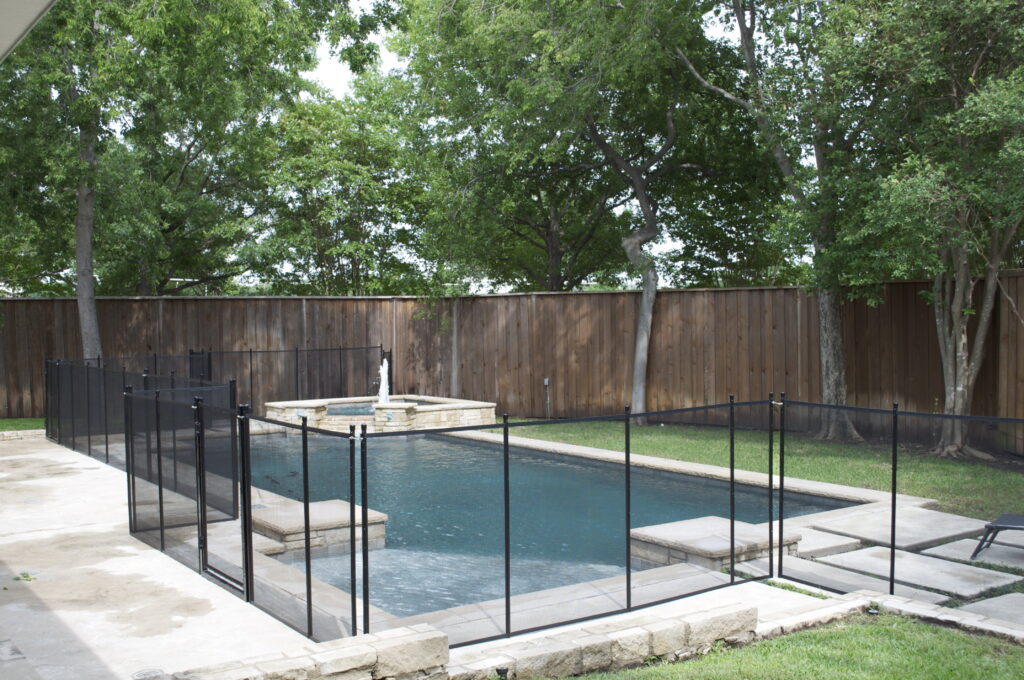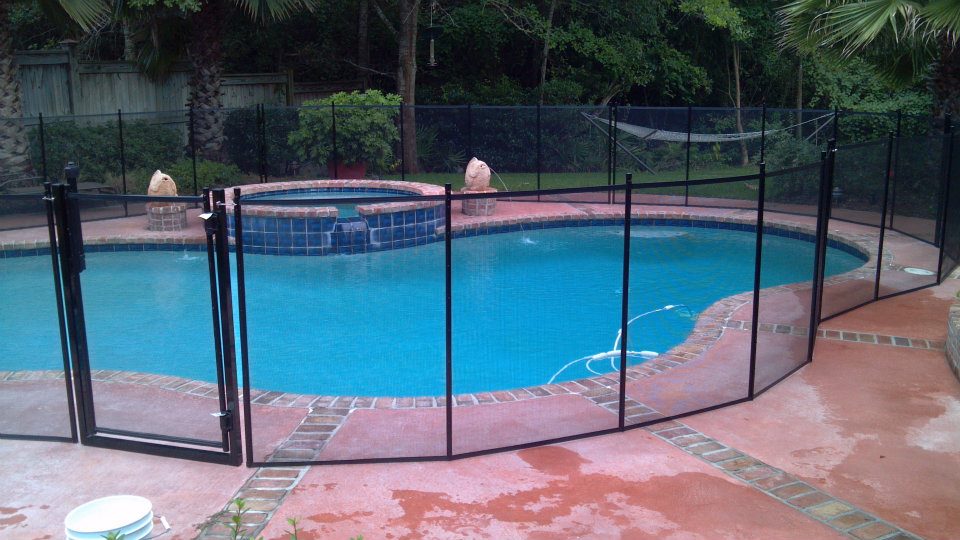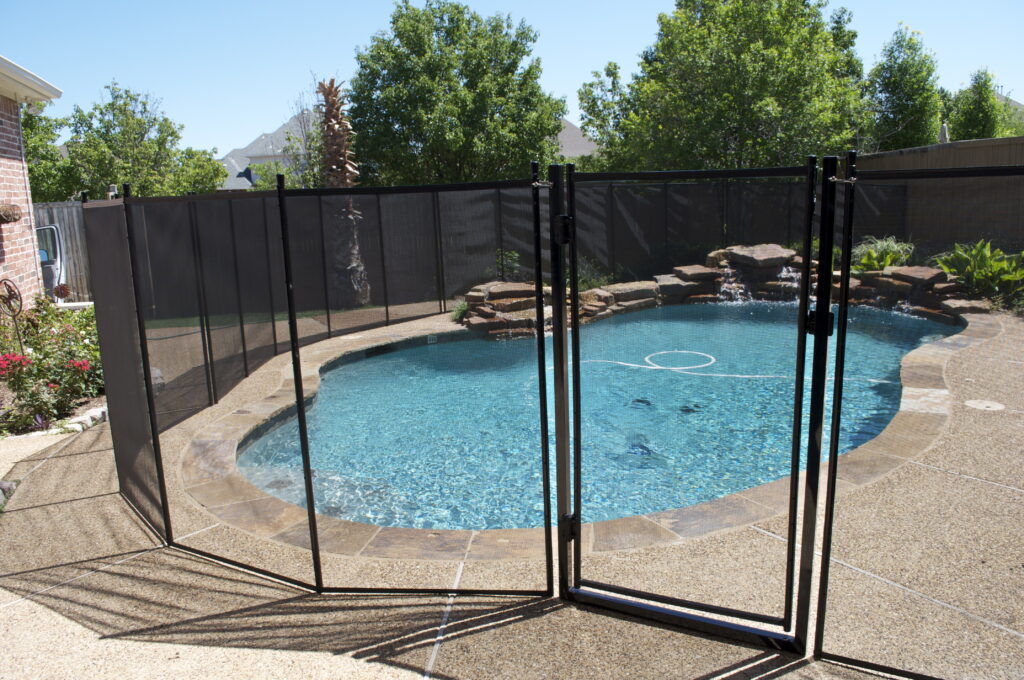A beautiful pool means nothing if it puts your family at risk. In just a few seconds, a child can wander near the water, and without a secure barrier, the consequences can be tragic.
That’s why the pool fence requirements South Carolina enforces are so important. These laws aren’t just red tape, they’re designed to save lives. And while the state follows national safety standards, each city can have its own local codes that take things a step further.
Whether you’re in Columbia, Charleston, Greenville, or Myrtle Beach, understanding both statewide pool fence regulations in South Carolina and your local pool fence codes is the only way to ensure you pass inspection and protect the people who matter most.
Let’s walk through the exact South Carolina pool fence laws homeowners need to follow, because real peace of mind starts with being fully informed and fully compliant.

When it comes to the pool fence regulation in South Carolina, the state has adopted international safety standards like the International Swimming Pool and Spa Code (ISPSC). These rules apply to all residential pools, and are designed to prevent accidental drownings, especially among children under six. Here’s a detailed look at the state-level pool fence requirements South Carolina homeowners must meet to stay legal and safe.
To meet pool fence requirements in South Carolina, your barrier must stand at least 48 inches (4 feet) high when measured from the outside ground level.
Why 48 inches? Because anything shorter increases the risk of children climbing over. A four-foot barrier acts as a visual and physical deterrent, strong enough to block unauthorized access, yet manageable to install with standard materials.
South Carolina regulations limit the vertical clearance between the fence and ground to no more than 2 inches. That might not sound like much, but to a crawling toddler or curious pet, it’s just enough space to slip through.
Even a small gap can be an escape route for a toddler or pet. Loose soil, uneven grass, or gravel bases must be leveled before installing your fence to prevent disqualification during inspection. That’s why it’s so important to install your fence on level ground. This rule applies to all pool fence materials, including mesh, wood, vinyl, and aluminum.
Pool fences in South Carolina must be designed with one simple rule in mind: no opening can be wide enough for a 4-inch ball to pass through. That’s not an arbitrary number, it’s based on the size of a small child’s head. If your fence has gaps larger than that, it fails inspection, no matter how sturdy it looks.
It’s not just about what the fence is made of, it’s how it’s built:
Metal fences, like wrought iron or aluminum, need tight, consistent spacing between pickets. Mesh fences should be pulled tight with no slack, since loose panels can stretch and create unsafe gaps over time. Even decorative elements, like scrollwork or lattice, can unintentionally create climbable or passable openings if not properly measured.
That’s why every inch matters. During installation, be sure to check every section for spacing and always measure with safety in mind, not just looks.
In South Carolina, it’s not enough for a pool fence to simply block the way, it also needs to prevent children from climbing over. That’s where climb-resistant design comes in, and it’s one of the most important, and most overlooked, parts of staying compliant with the pool fence requirements South Carolina enforces.
The rule is simple: your fence shouldn’t give kids any kind of foothold or ladder-like structure.
If your fence has horizontal and vertical rails, and they’re spaced less than 45 inches apart, those rails must be placed on the inside (pool-facing) side. The spacing between the vertical rails should not exceed 1 ¾ in width. This keeps the fence out of reach from the outside, so it prevents children from climbing over the fence.
If the fence has horizontal and vertical rails and the tops of the horizontal members exceed 45 inches, then the spacing between the vertical rails should not exceed four inches.
And while decorative elements like lattice panels or cutouts can add curb appeal, they can also create unintended climbing points. That’s why the spacing within the cutouts on features like latticework, ornamental gaps, or textured surfaces should not exceed 1 ¾ so they don’t compromise safety.
For a barrier composed of a diagonal member, or a chain link fence with mesh and slats fastened at the top or the bottom, the openings should not exceed 1 ¾ inches in width.
Bottom line? A beautiful fence is great, but one that can’t be climbed is what really protects your loved ones.
When it comes to South Carolina pool fence regulations, the gate isn’t just another part of the barrier, it’s the part that gets tested the most. It’s opened, closed, pushed, pulled, and, most importantly, targeted by curious kids. That’s why the state sets strict rules for how your gate must function.
To stay compliant and keep your family safe, your pool gate must be self-closing and self-latching, which means it must automatically return to a locked or secure position after each use, without exceptions.
Gates are also required to swing outward, away from the pool, so they can’t be pushed open from the inside by children or pets.
The latch mechanism must be installed at least 54 inches from the ground. If it’s placed lower, it must be mounted on the pool-facing side and positioned at least 3 inches below the top of the gate. This setup is designed specifically to prevent small children from reaching over or manipulating the latch from the outside.
To meet both code and peace-of-mind standards, magnetic latches and tension-adjustable hinges are considered best in class. For reliable safety and long-term durability, we recommend the MagnaLatch by Pool Guard, a self-latching, childproof gate system trusted by inspectors and families across South Carolina.

While South Carolina adheres to national safety codes like the International Swimming Pool and Spa Code (ISPSC), enforcement and specific requirements can vary by city. Understanding your local pool fence regulations is crucial to ensure compliance and safety. Below, we break down the key requirements for major cities in South Carolina.:
Charleston County enforces strict pool safety standards in line with South Carolina’s adoption of the International Residential Code (IRC) Appendix G. These regulations are designed to prevent unsupervised access to pools, especially by young children, and are mandatory for both in-ground residential pools deeper than 24 inches.
| Requirement | Charleston Code Details |
| Minimum Fence Height | The fence must be at least 48 inches tall, measured from finished grade on the outside. |
| Gate Standards | Gates must be self-closing and self-latching, and must swing outward from the pool. |
| Latch Placement | Latch must be 54 inches above ground, or located on the pool-facing side and positioned at least 3 inches below the top of the gate. |
| Climb-Resistant Design | Fences must be non-climbable, with no horizontal rails that can act as footholds. |
| Gap Limitations | No openings may allow passage of a 4-inch sphere—this prevents child entry. |
| Using a House Wall | If a house wall is part of the barrier, doors must have audible alarms or self-closing, self-latching hardware. |
Looking for a compliant pool fence in Charleston? Work with expert pool fence installers in Charleston who understand local code and can help you pass inspection the first time.
In Columbia, pool fences are subject to general fence regulations, focusing on location, height, and appearance to maintain neighborhood harmony. These are the Columbia pool fence requirements:
| Requirement | Columbia Code Details |
| Minimum Fence Height | The barrier must be at least 48 inches tall, measured from the side facing away from the pool. |
| Gate Standards | Must swing outward, be self-closing, and include a self-latching device. |
| Latch Placement | If the latch is below 54″, it must be on the poolside, at least 3″ below the gate top, with no opening > ½ inch within 18 inches of latch. |
| Climb-Resistant Design | – If horizontal rails are < 45 inches apart, they must be on the poolside.- Vertical spacing must be ≤ 1¾ inches.- Decorative cutouts must also be ≤ 1¾ inches wide.- If horizontal rails are ≥ 45 inches apart, vertical spacing can be up to 4 inches. Cutouts are still limited to 1 3⁄4 inches. |
| Gap Limitations | Openings must not allow a 4-inch sphere to pass through. |
| Solid Barrier Surfaces | Must have no indentations or protrusions, except normal joints/tolerances. |
Greenville may follow state guidelines, but local enforcement takes pool safety seriously. If you’re a homeowner in Greenville County, understanding these local pool fence rules is essential, not just to pass inspection, but to protect the people you care about most.
| Requirement | Greenville Code Details |
| Minimum Fence Height | The barrier must be at least 48 inches tall, measured from the side facing away from the pool or spa. |
| Gate Standards | Gates must be self-closing, self-latching, and swing outward from the pool. |
| Latch Placement | If the latch is below 54 inches, it must be on the poolside, at least 3 inches below the top of the gate, with no opening greater than ½ inch within 18 inches of the latch. |
| Ground Clearance | Maximum 2 inches from ground to bottom of fence on non-solid surfaces (e.g., grass), and 4 inches on solid surfaces (e.g., concrete). |
| Climb-Resistant Design | -If horizontal rails are less than 45 inches apart, they must be on the poolside. Vertical spacing must be ≤ 1¾ inches.-Maximum mesh size: 2¼-inch square, unless slats are used to reduce openings to ≤ 1¾ inches.-Maximum opening formed by diagonal members shall be ≤ 1¾ inches. |
| Gap Limitations | Openings in the barrier shall not allow passage of a 4-inch diameter sphere. |
If you are looking for a safe and reliable pool fence in Greenville specifically, it’s time to explore professional pool fence installation and top-rated pool fence installers in Greenville to secure your home today.
Yes. If your pool is more than 24 inches deep, South Carolina law requires it to be fully enclosed with a code-compliant barrier. This applies to both in-ground and above-ground pools.
Only if it meets all safety standards. Your existing fence must comply with height, gate, and gap regulations—otherwise, it won’t pass inspection. In some cases, modifications may be needed.
Yes, in many situations. If the house forms part of the pool barrier, any doors with direct pool access must have audible alarms or self-closing, self-latching hardware to meet code.
Yes, in most cases. Local building departments typically require a permit and final inspection to ensure your pool fence meets all regulations. Always check with your city or county before beginning installation.

A pool fence isn’t just a legal requirement, it’s one of the most important safety features you can invest in. By following the strict pool fence requirements in South Carolina, you’re not only protecting your property, you’re giving your family and neighbors peace of mind.
Need help understanding local codes or choosing the right fence?
Contact Pool Guard South Carolina today for expert advice, premium materials, and fully code-compliant installation guaranteed to pass inspection.
Please fill out the form below with your information. Your local dealer will be notified about your inquiry.
Please fill out the form below with your information. Your local dealer will be notified about your inquiry.